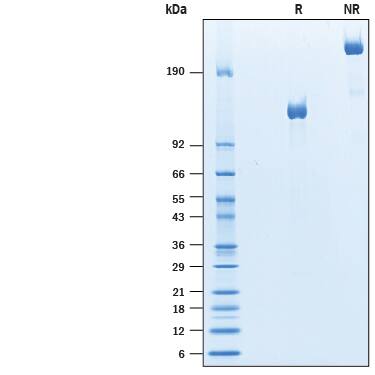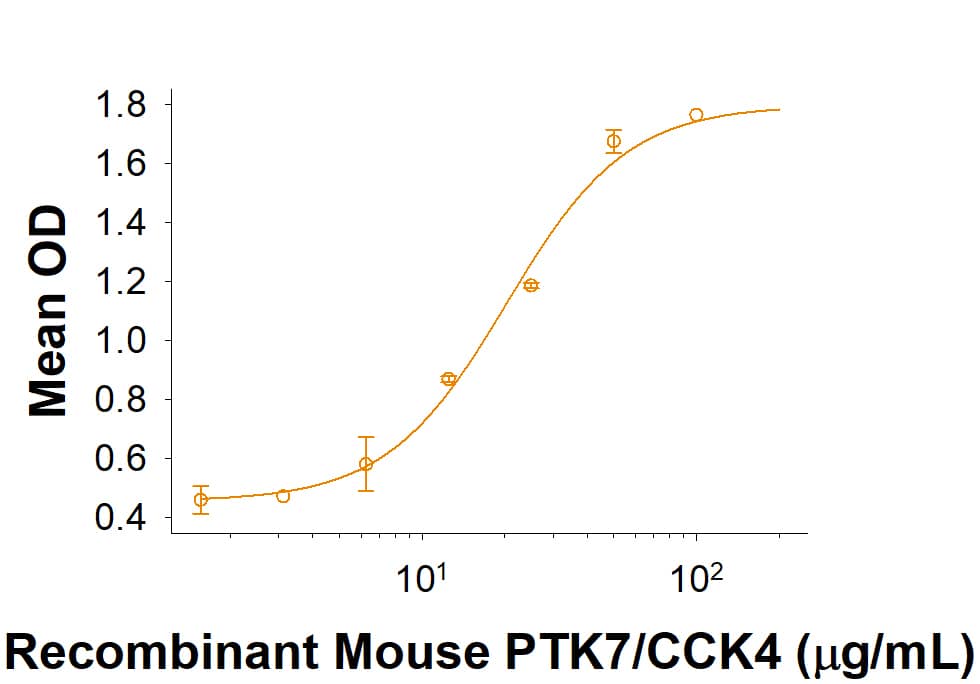Recombinant Mouse PTK7/CCK4 Fc Chimera Protein, CF
R&D Systems, part of Bio-Techne | Catalog # 10333-TK

Key Product Details
Source
NS0
Accession #
Structure / Form
Disulfide-linked homodimer
Conjugate
Unconjugated
Applications
Bioactivity
Product Specifications
Source
Mouse myeloma cell line, NS0-derived mouse PTK7/CCK4 protein
| Mouse PTK7/CCK4 (Ala23-Thr696) Accession # Q8BKG3 |
IEGRMDP | Mouse IgG2A (Glu98-Lys330) |
| N-terminus | C-terminus |
Purity
>95%, by SDS-PAGE visualized with Silver Staining and quantitative densitometry by Coomassie® Blue Staining.
Endotoxin Level
<0.10 EU per 1 μg of the protein by the LAL method.
N-terminal Sequence Analysis
Ala23
Predicted Molecular Mass
102 kDa
SDS-PAGE
110-130 kDa, under reducing conditions
Activity
Measured by its binding ability in a functional ELISA.
Recombinant Mouse PTK7/CCK4 Fc Chimera (Catalog # 10333-TK) binds Biotinylated Recombinant Mouse Wnt-3a (Catalog # BT1324). The ED50 for this effect is 8-48 μg/mL.
Recombinant Mouse PTK7/CCK4 Fc Chimera (Catalog # 10333-TK) binds Biotinylated Recombinant Mouse Wnt-3a (Catalog # BT1324). The ED50 for this effect is 8-48 μg/mL.
Scientific Data Images for Recombinant Mouse PTK7/CCK4 Fc Chimera Protein, CF
Recombinant Mouse PTK7/CCK4 Fc Chimera Protein Binding Activity
Recombinant Mouse PTK7/CCK4 Fc Chimera (Catalog # 10333-TK) binds Biotinylated Recombinant Mouse Wnt-3a (Catalog # BT1324) . The ED50 for this effect is 8-48 µg/mL.Recombinant Mouse PTK7/CCK4 Fc Chimera Protein SDS-PAGE
2 μg/lane of Recombinant Mouse PTK7/CCK4 Fc Chimera (Catalog # 10333-TK) was resolved with SDS-PAGE under reducing (R) and non-reducing (NR) conditions and visualized by Coomassie® Blue staining, showing bands at 110-130 kDa and 220-160 kDa, respectively.Formulation, Preparation and Storage
10333-TK
| Formulation | Lyophilized from a 0.2 μm filtered solution in PBS with Trehalose. |
| Reconstitution | Reconstitute at 500 μg/mL in PBS. |
| Shipping | The product is shipped at ambient temperature. Upon receipt, store it immediately at the temperature recommended below. |
| Stability & Storage | Use a manual defrost freezer and avoid repeated freeze-thaw cycles.
|
Background: PTK7/CCK4
References
- Shin, W. et al. (2008) Biochem. Bioph. Res. Co. 371:793.
- Meng, L. et al. (2010) PLoS ONE 5:e14018.
- Golubkov, V. et al. (2010) J. Biol. Chem. 285:35740.
- Berger, H. et al. (2017) Front. Cell Dev. Biol. 5:31.
- Park, S. et al. (1996) J. Biochem. 119:235.
- Golubkov, V. et al. (2014) J. Biol. Chem. 289:24238.
- Prebet, T. et al. (2010) Blood. 116:2315.
- Peradziryi, H. et al. (2012) Arch. Biochem. Biophys. 524:71.
Long Name
Protein Tyrosine Kinase 7
Alternate Names
CCK4
Gene Symbol
PTK7
UniProt
Additional PTK7/CCK4 Products
Product Documents for Recombinant Mouse PTK7/CCK4 Fc Chimera Protein, CF
Product Specific Notices for Recombinant Mouse PTK7/CCK4 Fc Chimera Protein, CF
For research use only
